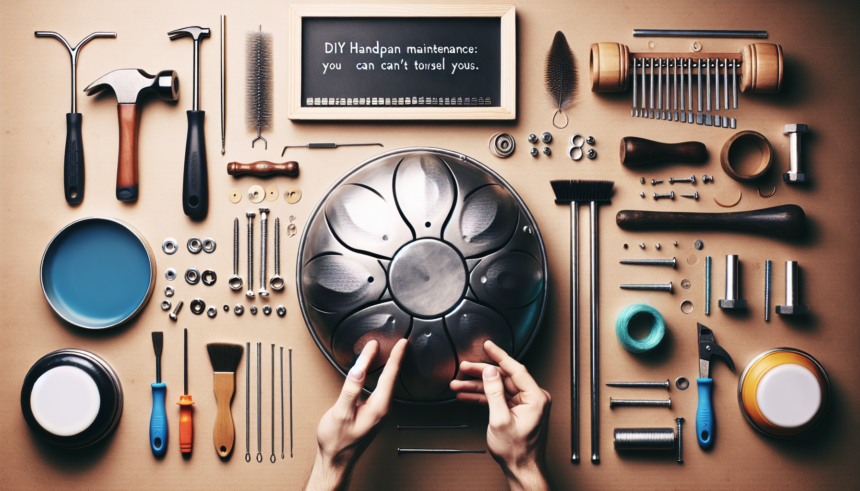<!DOCTYPE html>
<html lang="en">
<head>
<meta charset="UTF-8">
<meta name="viewport" content="width=device-width, initial-scale=1.0">
<title>Handpan Maintenance</title>
<style>
body {
font-family: Arial, sans-serif;
margin: 20px;
line-height: 1.6;
}
h1, h2, h3 {
color: #333;
}
h2 {
margin-top: 30px;
}
ul {
margin: 10px 0;
padding-left: 20px;
}
</style>
</head>
<body>
<h1>DIY Handpan Maintenance: What You Can and Can't Do Yourself</h1>
<p>The handpan, with its ethereal tones and mesmerizing resonance, has captivated musicians and music lovers worldwide. Like any musical instrument, a handpan requires regular maintenance to preserve its sound quality and extend its lifespan. While some maintenance tasks can be done yourself, there are certain aspects that require professional expertise. This article will guide you through what you can and can't do yourself in terms of handpan maintenance.</p>
<h2>Understanding Your Handpan</h2>
<p>A handpan is a beautifully crafted percussion instrument made from two half-shells of steel that are glued together. The top shell, known as the ding side, features a central note surrounded by a circle of tone fields. The bottom shell, or the gu side, usually has a single large hole. Understanding the structure and materials of your handpan is crucial for effective maintenance.</p>
<h2>What You Can Do Yourself: DIY Handpan Maintenance</h2>
<p>Maintaining your handpan involves a few simple, yet essential tasks. By including these in your regular routine, you can ensure that your instrument remains in optimal condition.</p>
<h3>1. Regular Cleaning</h3>
<p>Your handpan can accumulate dust, dirt, and fingerprints over time, which can impact its appearance and potentially affect sound quality if not cleaned regularly. Clean your handpan with a microfiber cloth to gently remove dust and dirt. For deeper cleaning, slightly dampen the cloth with water or use a handpan cleaner that's specifically designed for the type of steel used in your instrument. It's important to avoid soaking the handpan or using harsh chemicals, as this could damage the metal.</p>
<h3>2. Rust Prevention</h3>
<p>Handpans are often made of nitrided steel, which can be susceptible to rust if not properly cared for. To prevent rust, regularly apply a thin layer of oil (such as coconut or olive oil) to the surface using a clean cloth. Ensure the oil is food-grade to avoid harmful residues. After applying the oil, buff the surface with a dry cloth to remove excess and give the handpan a smooth finish. Make sure your handpan is stored in a dry environment, and consider using a dehumidifier to control humidity levels if necessary.</p>
<h3>3. Proper Storage</h3>
<p>Storing your handpan properly is essential for its maintenance. Always keep your handpan in a protective case when not in use to prevent it from getting scratched or damaged. Store it in a room with stable temperature and humidity, avoiding places with direct sunlight, excessive heat, or moisture. Handpans are sensitive to temperature changes, which can affect their tuning, so it's important to maintain a stable environment.</p>
<h3>4. Regular Inspection</h3>
<p>Frequently inspect your handpan for signs of damage such as dents, scratches, or rust. Early detection of potential issues allows you to address them before they become severe problems. Pay attention to any changes in the sound quality, as this could indicate that a note has gone out of tune or that there is a structural issue.</p>
<h2>What You Shouldn’t Attempt: Professional Handpan Maintenance</h2>
<p>While there are several maintenance tasks you can perform yourself, some require a professional's touch. Attempting these tasks without the requisite skill and knowledge can lead to irreversible damage.</p>
<h3>1. Tuning</h3>
<p>Tuning a handpan is an intricate process that demands a deep understanding of acoustics and a trained ear. Even slight adjustments can significantly alter the sound and quality of an instrument. Attempting to retune a handpan on your own could result in permanent damage. It is best to leave tuning to experienced handpan tuners who possess the expertise and equipment necessary to do the job accurately.</p>
<h3>2. Dent Removal</h3>
<p>If your handpan gets dented, you might be tempted to fix it yourself. However, removing dents can be a delicate procedure that, if done improperly, can cause further damage to the instrument. The metal needs careful manipulation to restore its original shape without affecting the sound. This process should be entrusted to a professional who can ensure the handpan's integrity is maintained.</p>
<h3>3. Welding and Metal Work</h3>
<p>Handpans undergo a precise welding process during their manufacture. Any post-manufacture welding or metal work should only be carried out by professionals with experience in working with musical instruments. Untrained attempts can weaken the structure and alter the sound, leading to irreparable harm.</p>
<h3>4. Major Repairs</h3>
<p>Cracks or severe structural issues require the attention of an expert. Major repairs involve complex processes which, in amateur hands, might result in a compromised instrument. It's advisable to reach out to the manufacturer or a reputable handpan maker for such repairs.</p>
<h2>Conclusion</h2>
<p>Handpan maintenance is a crucial aspect of owning this musical instrument. By understanding what you can confidently do yourself and recognizing when professional help is needed, you can ensure your handpan remains in excellent condition for years. Regular cleaning, rust prevention, proper storage, and inspections are tasks suited for DIY maintenance. Meanwhile, tuning, dent removal, welding, and major repairs should be left to skilled professionals. By approaching handpan maintenance with care and respect, you'll preserve its enchanting sound and ensure that the beautiful harmony it brings into your life continues uninterrupted.</p>
<h2>FAQs</h2>
<h3>1. How often should I clean my handpan?</h3>
<p>It depends on the frequency of use and your playing environment. Generally, a weekly wipe down with a microfiber cloth and a monthly application of oil is a good routine for most players.</p>
<h3>2. Can I use normal steel cleaner for my handpan?</h3>
<p>No, it's best to use a cleaner specifically designed for handpans or nitrided steel to avoid damaging the surface and sound quality of your instrument.</p>
<h3>3. Is it okay to leave my handpan in a car?</h3>
<p>No, it's not advisable to leave your handpan in a car as temperature fluctuations and humidity levels inside a vehicle can negatively impact the instrument’s tuning and structure.</p>
<h3>4. What should I do if my handpan is out of tune?</h3>
<p>If you notice your handpan is out of tune, it's essential to contact a professional handpan tuner who can make precise adjustments to restore its sound quality.</p>
<h3>5. Can I fix a crack in the handpan myself?</h3>
<p>Fixing a crack is a complex task best left to professionals. Attempting to do it yourself may worsen the damage and compromise the instrument's sound integrity.</p>
</body>
</html>DIY Handpan Maintenance: What You Can and Can’t Do Yourself

Leave a comment




